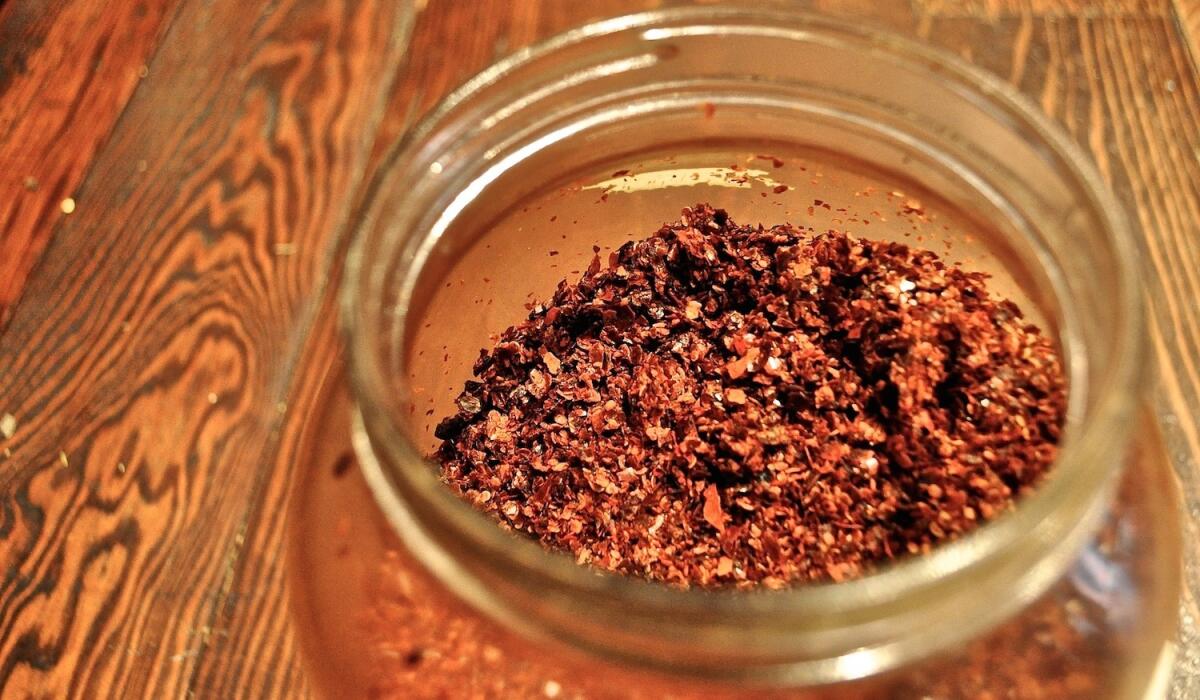Can’t find Aleppo pepper? Here’s why, and what to substitute

- Share via
If you, like many of us, are somewhat addicted to fruity, spicy Aleppo pepper, you’ve probably also noticed that you can’t find it anymore. Why? Quick geography quiz: Where’s Aleppo? Right, Aleppo is in Syria, which is currently in the middle of a massive, catastrophic civil war.
This means many things, most all of of them far more important than where we get our spices. Nevertheless, the question arises of what spices to substitute for Aleppo pepper until that war ends. The folks at Spice Station are here to help.
The Spice Station, on Sunset Boulevard in Silver Lake, is a kind of magical place, a peaceful spot that’s about as far away from war-torn Aleppo as it’s possible to be in Los Angeles. It’s a tiny spice store, filled with jars and tins, wooden shelves loaded with spices and teas, bronze spice grinders and scales and mortars and pestles and interesting photographs. Imagine if Peter Jackson owned an apothecary shop.
There are jars and jars, filled with vadouvan, ras al hanout, curry, piri piri, garam masala, spice mixtures and rubs such as Uyghur BBQ rub, and all kinds of teas. They also sell chile peppers, the jars lining one wall like a spice library.
Spice Station is the five-year-old shop owned by Bronwen Taws; there are two other sister shops in Montreal. On Tuesday, Bryan Rucker (who is the cousin of Portland’s Le Pigeon chef Gabriel Rucker but is not related to Gjusta and Gjelina pastry chef Nicole Rucker) was measuring out spices for customers in the little weighing room behind the counter.
Rucker says he hasn’t seen Aleppo pepper since late spring or early summer, and cautions that you probably won’t find any of it anymore: If you do, it’s probably either old or fake, since the war has been going on for some time.
“You get a full course in geopolitics when you work here,” says Rucker.
What to get instead? Marash pepper is smokier and carries a little more heat than Aleppo pepper, but is very similar. It also looks pretty much the same, with a coarse grind that makes it a great finishing pepper.
Marash pepper is from Turkey, as is Antebi pepper, which is another good alternative to Aleppo pepper. Antebi pepper, which looks pretty much the same as both Marash and Aleppo peppers, is a bit more fruity, and milder than both Aleppo and Marash peppers. Rucker describes it as more “vegetal,” with an aroma more of bell peppers than of hotter chile peppers.
If you’re an Aleppo addict, either of these Turkish peppers are excellent substitutes for what you’re missing. You might also try Urfa pepper, which is far darker and much smokier than any of these three but also pretty wonderful. (See: Jonathan Gold’s list of holiday food gifts.)
And if getting into your local spice shop isn’t an option, at least any time soon, you might try blending cayenne and paprika, both of which you probably have in your spice cabinet right now.
Finally, since it’s close to the end of 2014, consider this a reminder to survey that spice cabinet and switch out anything that’s been there since this time last year. Spices have shelf-lives — some more than others — and if they get too old, they’ll start to taste less like lovely additions to your dinner and more like sawdust.
Spice Station: 3819 Sunset Blvd., Silver Lake, (323) 660-2565, spicestationsilverlake.com
Lots of pictures of chiles and hot sauce on Instagram @ascattergood.
More to Read
Eat your way across L.A.
Get our weekly Tasting Notes newsletter for reviews, news and more.
You may occasionally receive promotional content from the Los Angeles Times.

![LOS ANGELES, CA - JUNE 17: [Cody Ma and Misha Sesar share a few dishes from their Persian Restaurant Azizam] on Monday, June 17, 2024 in Los Angeles, CA. (Ethan Benavidez / For The Times)](https://ca-times.brightspotcdn.com/dims4/default/7ffc7f6/2147483647/strip/true/crop/5110x3417+306+0/resize/320x214!/quality/75/?url=https%3A%2F%2Fcalifornia-times-brightspot.s3.amazonaws.com%2F79%2Fdc%2F4d29255545f5b9813315901692bc%2F1459972-fo-azizam-review20-eba.JPG)









